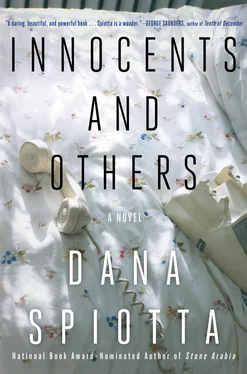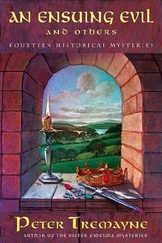“Have you climbed on top?”
“Not yet. But I would love that. I’m too scared, though.”
“I’m glad to hear that scares you.”
“I want to strap myself and my tripod onto the cowcatcher of a locomotive and film a phantom ride across the United States in real time. Just the POV of the locomotive eating track as the world unfurls around it. Sixty hours of pure one-shot cinema.”
“If only it were 1895,” Carrie said.
“If only,” Meadow said.
Carrie laughed. Meadow longed to be a barnstormer, a tightrope walker, an escape artist, an inventor. Or maybe she just liked the idea of film as a record of a filmmaker’s feat. The making of the film as the art, and the film itself as merely an artifact of that artistic act, not the art itself. Meadow wanted her inventiveness noticed, which Carrie considered a “showman” style: the dazzling concept that just points back to the filmmaker no matter where the camera is turned. Carrie would like to make a film of Meadow making films. See the girl strapped to a train!
“You want to watch some of it?” Meadow looked doubtful even as she suggested it.
“Sure.”
“Okay,” Meadow said. “Excellent.” But instead of making a move to one of the two projectors, Meadow walked over to a mini-fridge and pulled out two bottles of beer. She banged the bottle caps against the table edge: first one, then the other. She stood there and waited, holding a bottle out. Carrie walked to her and reached for the beer.
“Thanks.”
Meadow took a long swig and smiled. Her hair was cut short, and she looked lean and boyish in her jeans and sleeveless t-shirt. She seemed even more boyish when she pulled a cigarette out of the pack on the table and lit up. She squinted as she took a drag, and her bangs fell in her face. She folded one arm across her chest and braced it under the other arm and hand that held the cigarette, exposing — or showing off — her defined biceps. She looked older and tougher than Carrie did, especially since Carrie had gained weight (12.6 pounds) from eating so much starch in the dorm cafeteria all year.
The door to the hall pushed open, and a young man stepped through. He looked young, maybe sixteen. His chin-length hair was blunt cut and dyed black. His dark-lashed eyes stood out against his pale skin. He was wearing eyeliner, which, perhaps because it was smudged, made him look androgynous rather than girlish. He wore the same outfit as Meadow: sleeveless t-shirt and narrow-cut jeans. And like Meadow, he was skinny but muscular. He smiled at Carrie. He was beautiful, Carrie decided, if odd-looking.
“This is Local Dave,” Meadow said. He shook his head wearily. “Deke! A joke. His name is Deke, really. He’s a son of Gloversville, an outcast, and now he helps me make movies.” At the word outcast , Deke’s eyes widened and he held up his large hands and waved his ringed fingers at Carrie.
“I’m Carrie.”
“Hi,” he said. He stood next to Meadow and their shoulders touched. He leaned slightly against her. Leave it to Meadow to find the one gorgeously odd kid in Gloversville and make him her soundman/boyfriend.
“Meadow and I grew up together in LA.”
“He knows all about you, Carrie,” Meadow said. “I talk about you a lot.”
“You are best friends,” he said.
“Yes,” Carrie said. “We are.” It was nice to hear it. She liked to think Meadow felt that way, even if she never believed that Meadow exactly needed anything from her. That night they ate thickly cheesed delivery pizza, drank wine, and watched a movie projected on a sheet Deke had hung on the warehouse wall. Meadow ran the projector. Meadow used their old teacher, Jay Hosney, to help her rent movies from MoMA and the New Yorker Theater and other film libraries. They watched a 16 mm print of Antonioni’s Red Desert. Meadow rented it for a week, and she had already seen it five times.
Carrie watched Monica Vitti framed against the vast rusted hull of a ship. A good film to see if you are making films in the midst of industrial ruin, like a leather tannery or a glove factory.
And then Meadow showed Carrie her train film. Train films , rather. She had made a dozen of these short, odd documents. As Carrie looked at some very impressive and distorted close-to-the-tracks shots, Carrie wondered: what had it been like up here this past spring, with Meadow in a frenzy, in an obsession with something? Manic, possessed, as if she were enacting some cliché of an artist? All these repetitions and her relentless revisions of one idea were interesting, but what for? Who could even say what they were?
In high school, when Meadow decided films were her thing (and it was like that, a big decision, an announcement, as if her biography were already being written, as if the biopic were being filmed, bold-print supertitles appearing over her head), she began to obsess over old cinema artifacts: viewers, lenses, projectors, film stocks. She built a Mutoscope by hand. She bought old spectrographs, Kinetoscopes, and zoetropes and rebuilt them. She played with them. It was as if she had to go through the discovery of film step by step, all on her own. She had to invent it all for herself. Carrie often felt perplexed by Meadow’s extremes. Making a film was already hard enough. Why not just step in and go from here? Why be so difficult and take the long way to everything?
After months of making Carrie watch silent films, Meadow moved on to specific filmmakers: John Ford, Nicholas Ray, Douglas Sirk, Orson Welles, Howard Hawks. Then it was the European New Wave, then she discovered Japanese filmmakers, then the American filmmakers of the ’70s. Then the cinéma vérité documentaries, direct cinema, and kino-pravda. She had a passion for comprehensiveness that wasn’t really possible. The dishonest part of it was the way she seemed to embrace things by rejecting what she had previously embraced. John Ford had to be seen as vastly inferior to Howard Hawks. It was Godard vs. Truffaut. As if engaging art became a conversion experience. Which felt juvenile and, well, reductive to Carrie. Carrie enjoyed a film even as she could see its flaws. She didn’t need to be obsessed or disillusioned. That exhausted her. She consciously sought out films made by women. She didn’t care if they were nakedly commercial productions or hardly seen lost films. She liked to think about Ida Lupino or Lina Wertmüller as well as Penelope Spheeris or Amy Heckerling. She liked the idea of taking a genre — say the high school film — and doing a really interesting version of it. Not breaking the form, but pushing it in subtle ways. You would get an audience, right? And there could be room for unexpected things. Even subversive things.
It was unclear, at the end of the night, where Carrie would sleep. Meadow hadn’t thought about it, apparently. They went back to the apartment Meadow rented near the warehouse and Carrie slept on the couch under a sheet and with a throw pillow under her head. She heard murmurs from Meadow’s room. She tried not to listen, and then she put her headphones on and listened to Maria Callas sing.
THE ARRIVAL OF THE TRAIN AT LA CIOTAT STATION I
Meadow showed Carrie the train movies even though Meadow knew Carrie wouldn’t appreciate what had gone into them. All spring Meadow had risen at five every day, not for any practical reason but for the feeling of immersion. She needed to feel the pain of her devotion. She drove the old Subaru down to Route 5s, which runs parallel to the Mohawk River. She knew it was a horse trail once, the one narrow pass between the mountain ranges if you needed to go west, and of course everyone always needed to go west. First the Erie Canal paralleled the Mohawk, then the railroad, then I-90. Meadow loved how each thing remained even as it was surpassed by new technology: the river, the canal, the railroad, and the Interstate lay right next to one another like a graphic depicting two centuries of progress. But her attention was drawn to the freight trains; their approach and passing were infinitely more beguiling than the semitrucks that monotonously thundered down I-90.
Читать дальше












